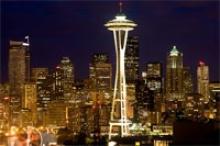Glenn Fleishman, of the excellent
Wi-Fi Net News, recently
interviewed Mike McGinn, a candidate for Mayor of Seattle that has talked frequently about the need for a publicly owned full fiber network in the City.
Larger cities have been slow to move on publicly owned broadband, in part because they typically already have some level of service available throughout the city (though perhaps not universally). Fleishman rightly notes this:
But is the fact that people can “only” get slow Internet connections enough to float $450 million in bonds, however financed? McGinn says that there are two separate reasons to push for universal availability. “Access to the Internet is access to the economy, access to the community, in some cases access to democracy, access to issues,” he says. But it’s also about the bottom line: “It’s an essential [piece of] infrastructure to compete in a world economy.”
Fleishman also notes a concern frequently cited by incumbent carriers who don't want a public network to compete against:
There have been many concerns raised about public entities, especially those with regulatory power over competitors–such as Seattle’s cable franchise board that controls access to public rights of way and facilities–entering the broadband market. But most of those concerns imply that the market will solve the problem. However, with no requirement for building out service to all customers, or having the same level of service available, an efficient market won’t provide universal coverage.
In my experience, this is a theoretical fear. Typically, when a community decides to build its own network, the incumbents rush to upgrade their infrastructure (often after denying that they thought there was a need for faster services in the area). If local governments were abusing their authority over the right of way, you can bet there would have been lawsuits filed - these incumbents have sued over everything else. I do not know of a single successful lawsuit against a local government for what would be a violation of law.
Getting back to the interview, they discuss both Lafayette, Louisiana:
The reason for the fight wasn’t about the right to 500 channels, about low prices, or about the city wanting a piece of the action.








